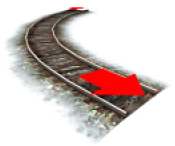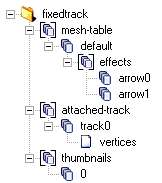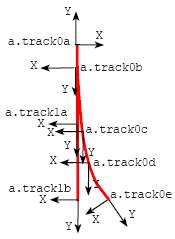CCG/Fixed-Track
Contents |
KIND: FIXEDTRACK
Description
A fixedtrack asset can be likened to a model trains sectional track system. The models may be straight or curved and snap into position when moved on to another track in Surveyor.
Container Structure
A well formed fixedtrack kind has the following container structure:
See Chapter 7 for an example asset of this kind.
A TYPICAL ASSET OF THIS KIND MAY HAVE THE FOLLOWING TAGS:
kind "fixedtrack" username data kuid kuid preview-mesh-kuid kuid trainz-build data category-class data category-region data category-era data mesh-table default mesh file auto-create data effects arrow0 att data default-mesh kuid surveyor-only data kind data arrow1 att data default-mesh kuid surveyor-only data kind data attached-track track0 track kuid vertices 0 data 1 data 2 data thumbnails 0 image file width data height data
TAGS AND CONTAINERS
The following tags are further defined in Chapter 5:
- kuid
- Generated automatically by Content Manager.
- trainz-build
- Automatically set to 2.9 for 2009 assets.
- category-class
- Should be "TF" - Fixed Track. See the "Track" section of Category Class.
'category-region
- See Category Region for a list of valid category-region values.
- category-era
- See Category Era for a list of valid category-era values.
- username
- Asset username. This will be the name that appears in the surveyor menu.
- kind
- Must be "fixedtrack".
- preview-mesh-kuid
- The mesh to be used in the surveyor preview area. This is useful when an asset has a large bounding box, i.e. the "Airport" with it's jet animation - also see below.
- Mesh Table
- Default - Contains the default mesh.
- Effects
- arrow0, arrow1 - These attachment effects place an arrow mesh at each end of the Default Mesh according to the attachmentpoints stored in the mesh file (and referenced in the vertices container). These arrows are used as guides and only shown in surveyor.
Additional Containers
As well as containing all of the common tags and containers detailed in Chapter 5 , the fixedtrack kind also contains additional containers and tags that are specialised to the requirements of the kind.
Attached Track Container
Auto-generated spline track. Generated through attachment points located within the default mesh. Attached-tracks update automatically to the spline track connected to it. You may over-ride this auto-update feature by adding useadjoiningtracktype 0
- Note. Correct track end attachment orientation is essential. The Y axis must point `out' at the correct angle. The Z axis must point `up' - see Page 75 .
The Attached Track Container has the following tags and containers:
- track
- Kuid of the track to be used.
- useadjoiningtracktype
- Indicates whether the track type should change to match that of the first track joined to the object or not.
- vertex
- Attachment points at which to place track.
Junction-Vertices Container
The Junction-Vertices Container contains the tags needed to handle the lever portions of a fixed track.
The Junction-Vertices Container has the following tags:
- junction-lever-mesh
- The mesh (selected from the mesh table) to be used as a junction lever.
- junction-vertex
- The attachment point (located in mesh file) at which to place the lever.
Additional Tags
- preview-mesh-kuid
- Each fixedtrack asset needs a preview-mesh as spline tracks will not render in the Preview window.A preview-mesh can simply be setup as a kind mesh. This way the preview-mesh will never be selectable or seen in Surveyor.
- use-gradient-track
- Uses the spline gradient rather than following the ground height.
A fixedtrack comprises a mesh asset with an attached track (or tracks) and surveyor only rendered arrows so the user knows where the fixedtrack starts and ends.
The model has attachment points (using the a.name naming convention) set-up accurately in Max or Gmax, and a single invisible polygon to allow exporting, and for in-game asset selection. Note. Correct track end attachment orientation is essential. For the end attachment points, the axis must point `out' at the correct angle. The Z axis must point `up'. Mid points just need to be in the correct spline path. See diagram below. TRS2004 released fixedtracks comprise of only curved and straight sections.
Crossings and junctions are created in TC using the attached-track set-up. For crossings, create two attached-track fields. For junctions do the same but use one of the attachments twice as shown below (where a.track0b is used as the common connection point).
For example:
attached-track track0 track <KUID:-1:15> useadjoiningtracktype 0 vertices 0 a.track0a 0 a.track0b 0 a.track0c 0 a.track0d 0 a.track0e track1 track <KUID:-1:15> useadjoiningtracktype 0 vertices 0 a.track0b 0 a.track0a 0 a.track1b junction-vertice 0 junction-lever-mesh "lever0" junction-vertex "a.track0b" 1 junction-lever-mesh "blades" junction-vertex "a.track0b"
See additional information on Page 383.
THIS KIND SUPPORTS THE FOLLOWING:
- CONTAINERS
- Mesh Table, queues Container, Smoke Container, SoundScript Container, Attached Track Container, Attached Trigger Container, String Table, Chinese String Table, Czech String Table, Dutch String Table, French String Table, German String Table, Italian String Table, Polish String Table, Russian String Table, Spanish String Table, KUID Table, Obsolete Table, Thumbnails, Privileges, Extensions, Junction-Vertices Container.
- TAGS
- kuid, trainz-build, category-class, category-region, category-era, username, kind, alias, author, autoname, category-keyword, class, contact-email, contact-website, description, description-cn, description-cz, description-de, description-es, description-fr, description-it, description-pl, description-nl, description-ru, dighole, floating, height-range, icon-texture, icon0, icon1, icon2, icon3, license, light, nightmode, organisation, preview-mesh-kuid, preview-scale, rgb, rollstep, rotate, rotate-yz-range, rotstep, script, snapgrid, snapmode, surveyor-name-label, surveyor-only, user-gradient-track, username-cn, username-cz, username-de, username-es, username-fr, username-it, username-nl, username-pl, username-ru.


